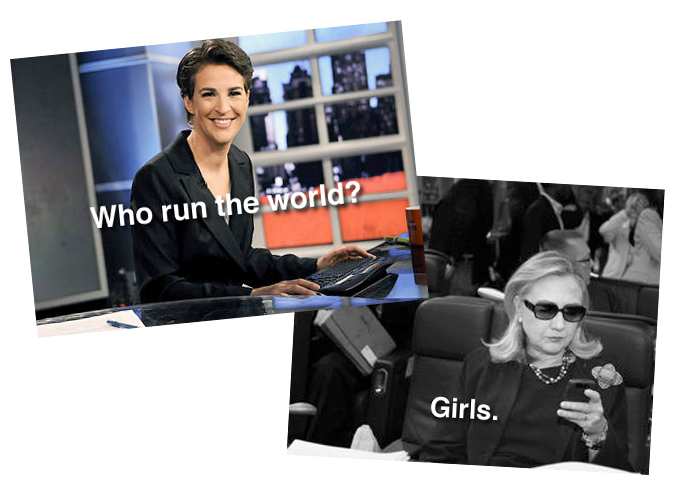Y’all didn’t think I’d let Girls Week come to a close without actually featuring the wit and wisdom of an actual, real-live girl did you? Of course not! So I Googled, “girl” and compiled some feedback on being a woman from a mash-up of Wikipedia entries probably written by women. Joke! I asked one of my best friends from college, Nicole, if she would mind contributing a piece about what it means to be a girl. Considering the pointed use of the term as the title of grown woman Lena Dunham’s hit show, and further considering that show’s second season debut as the impetus for this entire themed week, I feel it’s only fitting to analyze the conditions of its usage and ask what it feels like to be a girl vs. a woman (in a man’s world?) Graphic obviously from Texts From Hillary. P.S. Hillary 2016.
About four or five years ago, a male friend told me to turn on my TV because there was a girl talking about the presidential election. I fumbled for the remote. I’d seen a few adorable videos with children exploring their early political interests and singing parody songs about the election, so I was excited to hear what this girl had to say. When I flipped to CNN, my eyes popped when I realized that this girl was actually a middle-aged woman with a Ph.D in foreign policy. I’d expected to see a little kid and instead I was watching an incredibly articulate adult. To me, girlmeant child and to my friend, girl meant female. That’s when I started paying attention to the usage of girl versus woman.
Click through to continue reading this post!
I’m a word person. I studied feminist rhetoric in college and I am deeply invested in identifying the subtle gender-specific pronouns in our vocabularies. I know I’m hypersensitive to a lot of gender inequalities at which other people wouldn’t bat an eyelash. See what I did there? I don’t pay attention to these choices because I think it’s ironic, or funny, or interesting – I seek them out because I am so acutely aware of their impact. A few nights ago, while I was enjoying dinner with my partner, my phone buzzed. It was a group text from a family friend wishing a Happy New Year to, “my sweet girls and their men.” The message was meant sincerely, so I thanked her, but I couldn’t read it without considering the subliminal imbalance in her phrasing.
Unless there’s a distinct precedence to use “woman,” I’ve found that the general public usually uses “girl” to mean “female.” This would be okay if the gender equivalent “boy” was used as often to mean male…but it isn’t. Depending on the situation, a male may be a “guy,” or a “man,” or a “dude,” or a “bro”. While some of these are not the most flattering choices, they still emphasize dominating characteristics. When “boy” is used it’s to emphasize permissible immature behavior, because, you know, boys will be boys.
As girls – I mean, as women – we spend so much time distinguishing the boys from the men. We want a man who has a real job and savings account and an adult-size bed with a boxspring that isn’t resting on the floor. We don’t focus as much on the girl becoming a woman. It’s okay to be daddy’s little girl until, you know, you find someone else to take care of you. It’s okay if we don’t know how to change a tire or pay a bill – girls don’t like dirt. Or math. It may sound trivial, but these generalities and subtle diction choices make all the difference. As women, our titles are too often defined by our relationships to the men in our lives. We’re Little Miss Child until we’re married and then we’re Mrs. HusbandsName. Not me. No, thank you.
I’ll break it down a bit so next time you’re describing a female, you can decide which word to use:
Girls are children.Girls are fragile.Girls need parental consentGirls need a guardian to see a movie in a public theater.Girls must be escorted by an adult in expensive department stores.Girls have curfews.Girls have bedtimes.Girls are adorable dreamers, but, like little boys, they are also incredibly needy, reliant and submissive.
Women are adults.Women are strong.Women are self-sufficient.Women are in control of their own decisions.Women can vote.Women can drive.Women are responsible.Women can buy a house.Women can run for office.Women can hold rank in the military.Women can decline sex and unwanted advances.
Women can be adorable dreamers, too. And they are fun and playful and adventurous. Women are free to be everything that girls are, but because they have wisdom and perspective, they can make active decisions about who they want to be – decidedly not Mrs. HusbandsName.
Chiming in with my two cents here at the end – I think Nicole closes on an interesting point that actress Zosia Mametbriefly touched on in a Today Show interview, describing a person’s 20’s as a, “terribly selfish period of life,” a time when a person is preoccupied with coming to terms with his or her identity. It seems the wisdom and perspective Nicole mentions here as components of Womanhood and their apparent lacking in the characters in Girls may explain Dunham’s title choice. In which case I imagine we should just get rid of the term, “men,” because…I mean, really. (Joke!)[#donaldtrump] For more of Nicole, check out her blog. Like this post? Then read up on gender and sexuality here and here.
